Atlanta Firms Promoted Another Large Partner Class, But Men Still Outnumber Women
Bess Hinson, a new equity partner at Morris Manning, said taking risks in pursuing an emerging practice area made a difference in her path to partnership.
April 27, 2020 at 05:05 PM
6 minute read
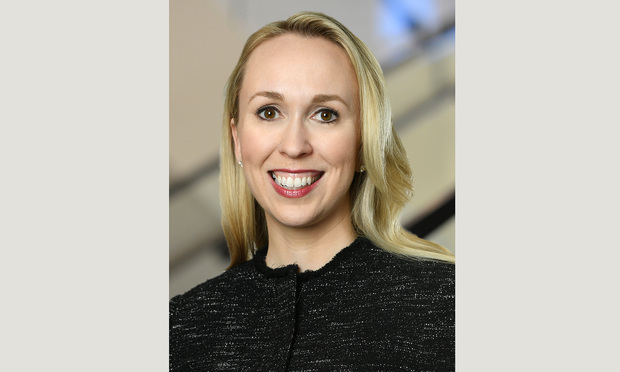 Elizabeth "Bess" Hinson, Morris Manning Martin, Atlanta. (Courtesty photo)
Elizabeth "Bess" Hinson, Morris Manning Martin, Atlanta. (Courtesty photo)
Atlanta law firms continued to promote relatively large numbers of new partners this year, but the percentage of women making partner declined, reversing some of last year's gains.
Women made up 41% of partner promotions this year, down from 45% last year, for the 101 promotions tracked by the Daily Report at 34 firms. That was still a big increase from 2018 when only 31% of Atlanta's new partners were women.
The 101 promotions were up from 82 new partners at 29 firms last year.
This year eight firms—a mix of Atlanta-based and national ones–promoted five or more local lawyers to partner, accounting for almost half—48%—of the promotions. For those eight, the Atlanta rate of women promoted, at 46%, was slightly higher than the overall rate of 41% for women.
Alston & Bird and Nelson Mullins Riley & Scarborough led the pack with eight Atlanta promotions each. (Alston promoted two women and six men locally, while Nelson Mullins promoted three women and five men, although nationally its record class of 29 new partners was almost evenly divided.)
Three of those eight firms promoted more women than men locally: three women and two men apiece at Atlanta's Morris Manning & Martin and Swift Currie McGhee & Hiers, while Seyfarth Shaw promoted four women and two men locally.
Atlanta-based litigation defense firm Copeland Stair Kingma & Lovell's class of six new partners was evenly divided between women and men while two other Atlanta-based firms, Arnall Golden Gregory and Taylor English Duma, each promoted three men and two women.
Litigator-Heavy Classes
Of the 101 new partners, 41 were litigators—by far the most common practice area for the group—followed by corporate, with 18 lawyers, and real estate, with 17. Those three areas accounted for 75% of the promotions.
There were some gender differences by practice area for the new partners. For intellectual property lawyers, men made up a full 73% of the 11 promotions, and two-thirds of the litigators were men. Of corporate attorneys, 61% were men.
But women were the majority in other practices. Even though they represented only 41% of total promotions, women made up 53% of new real estate partners. Women also had an edge in labor and employment, making up 60% of the five new partners. In health law, three of the four new partners were women.
As in past years, the new Atlanta partners were mostly graduates of Southern law schools, making up 79% percent of the total. The top schools for this year's class were the University of Georgia (20), Georgia State University (18), Emory University (17), Mercer University (9) and Vanderbilt University (3).
Infographics design by Roberto Jiménez
Embracing Innovation, Risk
One of Morris Manning's five new Atlanta partners, Bess Hinson, said making partner meant embracing innovation and being open to risk as she developed her cybersecurity and data privacy compliance practice. Morris Manning recruited her from Nelson Mullins in 2017 to head that practice.
"I made some transitions and took some risks. They paid off," said Hinson, 36, now an equity partner, as Morris Manning does not have a two-tiered partnership track. Morris Manning promoted a record class of eight partners in Atlanta and Washington, D.C., this year, including five women, increasing the 200-lawyer firm's partnership ranks by 10% for a total of 90.
"It feels like a decade ago now," Hinson said of becoming a partner in January. She added that the COVID-19 pandemic is creating new privacy issues as companies determine what employee data, such as temperatures or infection status, are permissible to collect. "And there's more risk of cyberattacks, since everyone is working remotely," she said.
Intrigued in college by the uncharted territory of companies collecting consumer data from social media, Hinson has pursued a cybersecurity and privacy compliance practice since earning a J.D. from the University of Michigan in 2011.
"Facebook was created while I was an undergraduate at Yale, so I was a witness to this new social media technology that rapidly expanded," Hinson said. "The ways companies collected that data would either lead to data breaches or an increased need for counsel—in compliance as well as liability."
"It was an area that captured my imagination," she said, noting that many of the regulatory laws had not yet been written. Lawyers need to embrace innovation, she added. "Many get into the routine, on a pretty hierarchical path, and they can get stifled."
After a federal appellate clerkship, Hinson started at King & Spalding in 2013 working on data breach litigation and class action defense. She moved to Nelson Mullins in 2015 to expand her practice's scope into compliance.
"Compliance can be a tough sell," she noted. "It's great if a company does not get into trouble, but it can be hard to quantify the benefits."
As she started developing her own clients, Hinson wanted to develop her practice "on my own terms." That prompted her to start the Atlanta Women in Cybersecurity Roundtable in 2017 for women lawyers and corporate tech officers. "It's a high-risk issue where everyone is grasping for knowledge and expertise," she said, and experienced leaders are still scarce. The group, which meets every quarter, has grown from 45 participants to about 80.
"It gave new meaning to my law practice as a way to meet other women professionals in this area, learn from their expertise and very organically network with clients," she said. "That gave me motivation to serve as a firm leader."
In her quest to make partner, Hinson added, "I took a really hard look at the options for a woman as an equity partner in deciding where to practice law."
Morris Manning's entrepreneurial culture and concentration of emerging tech clients fit with Hinson's desire to advise companies "every step of the way" on compliance needs, she said. "I'm looking at data protection addendums and privacy policies every day, while also working on some data breaches," she said. "It's what I do with 100 percent of my time. That's unusual."
For other aspiring partners, Hinson advises, "Have a unique practice where you are able to build a book because you're sought out for your subject-matter expertise. It's really made a difference in my career as a business generator."
This content has been archived. It is available through our partners, LexisNexis® and Bloomberg Law.
To view this content, please continue to their sites.
Not a Lexis Subscriber?
Subscribe Now
Not a Bloomberg Law Subscriber?
Subscribe Now
NOT FOR REPRINT
© 2025 ALM Global, LLC, All Rights Reserved. Request academic re-use from www.copyright.com. All other uses, submit a request to [email protected]. For more information visit Asset & Logo Licensing.
You Might Like
View All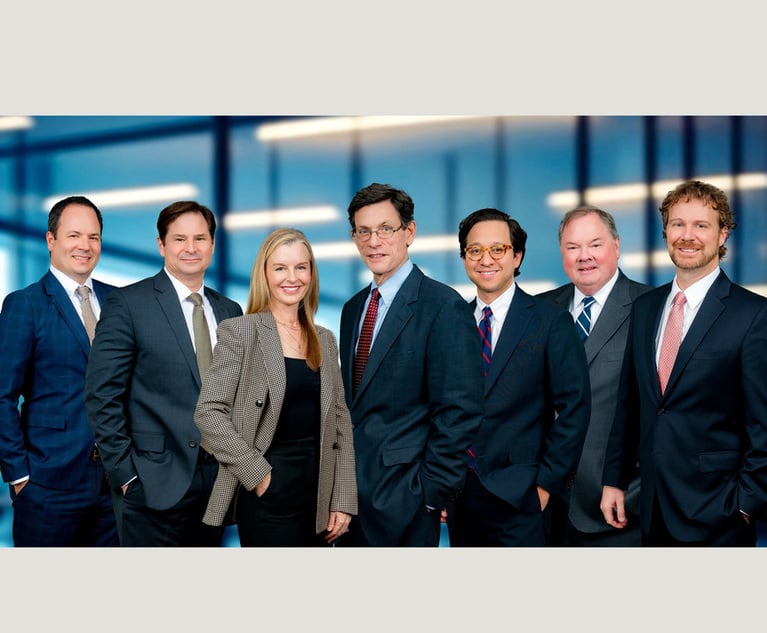
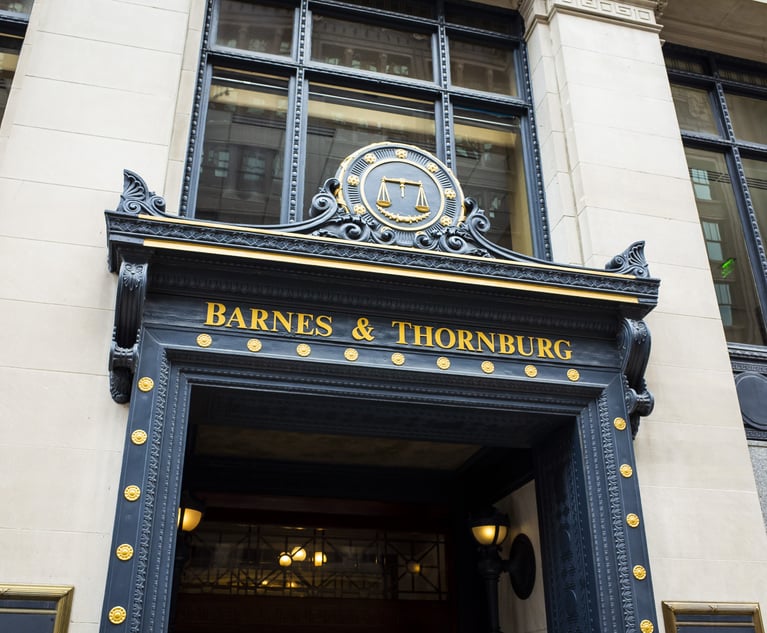
Georgia Justices Urged to Revive Malpractice Suit Against Retired Barnes & Thornburg Atty
4 minute read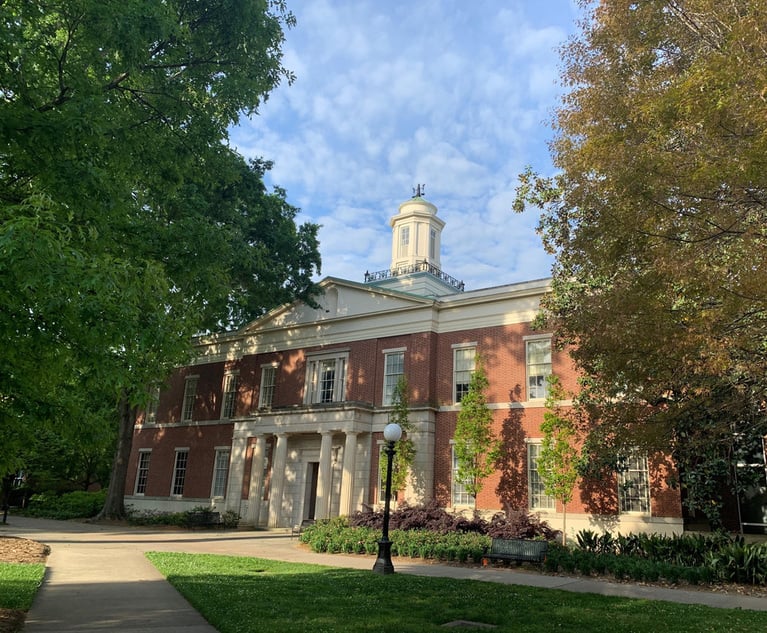
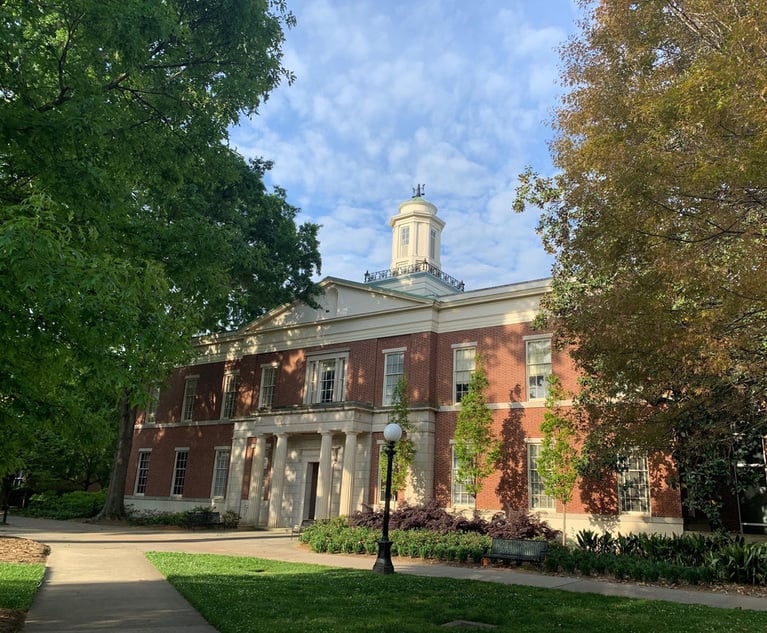
28 Firms Supporting Retired Barnes & Thornburg Litigator in Georgia Supreme Court Malpractice Case
7 minute readLaw Firms Mentioned
Trending Stories
- 1Varsity Brands Lures Aboard Keurig Dr. Pepper Legal Chief
- 2Federal Judge Warns of 'Serious Sanctions' on FDIC Over Document Retention
- 3Meet the Former NFL Player Now Back at Vinson & Elkins
- 4Inside Track: Cooley's Modest Proposal to Make Executives Safer
- 5Justified Termination Does Not Bar Associate Attorney From Unemployment Benefits, State Appellate Court Rules
Who Got The Work
J. Brugh Lower of Gibbons has entered an appearance for industrial equipment supplier Devco Corporation in a pending trademark infringement lawsuit. The suit, accusing the defendant of selling knock-off Graco products, was filed Dec. 18 in New Jersey District Court by Rivkin Radler on behalf of Graco Inc. and Graco Minnesota. The case, assigned to U.S. District Judge Zahid N. Quraishi, is 3:24-cv-11294, Graco Inc. et al v. Devco Corporation.
Who Got The Work
Rebecca Maller-Stein and Kent A. Yalowitz of Arnold & Porter Kaye Scholer have entered their appearances for Hanaco Venture Capital and its executives, Lior Prosor and David Frankel, in a pending securities lawsuit. The action, filed on Dec. 24 in New York Southern District Court by Zell, Aron & Co. on behalf of Goldeneye Advisors, accuses the defendants of negligently and fraudulently managing the plaintiff's $1 million investment. The case, assigned to U.S. District Judge Vernon S. Broderick, is 1:24-cv-09918, Goldeneye Advisors, LLC v. Hanaco Venture Capital, Ltd. et al.
Who Got The Work
Attorneys from A&O Shearman has stepped in as defense counsel for Toronto-Dominion Bank and other defendants in a pending securities class action. The suit, filed Dec. 11 in New York Southern District Court by Bleichmar Fonti & Auld, accuses the defendants of concealing the bank's 'pervasive' deficiencies in regards to its compliance with the Bank Secrecy Act and the quality of its anti-money laundering controls. The case, assigned to U.S. District Judge Arun Subramanian, is 1:24-cv-09445, Gonzalez v. The Toronto-Dominion Bank et al.
Who Got The Work
Crown Castle International, a Pennsylvania company providing shared communications infrastructure, has turned to Luke D. Wolf of Gordon Rees Scully Mansukhani to fend off a pending breach-of-contract lawsuit. The court action, filed Nov. 25 in Michigan Eastern District Court by Hooper Hathaway PC on behalf of The Town Residences LLC, accuses Crown Castle of failing to transfer approximately $30,000 in utility payments from T-Mobile in breach of a roof-top lease and assignment agreement. The case, assigned to U.S. District Judge Susan K. Declercq, is 2:24-cv-13131, The Town Residences LLC v. T-Mobile US, Inc. et al.
Who Got The Work
Wilfred P. Coronato and Daniel M. Schwartz of McCarter & English have stepped in as defense counsel to Electrolux Home Products Inc. in a pending product liability lawsuit. The court action, filed Nov. 26 in New York Eastern District Court by Poulos Lopiccolo PC and Nagel Rice LLP on behalf of David Stern, alleges that the defendant's refrigerators’ drawers and shelving repeatedly break and fall apart within months after purchase. The case, assigned to U.S. District Judge Joan M. Azrack, is 2:24-cv-08204, Stern v. Electrolux Home Products, Inc.
Featured Firms
Law Offices of Gary Martin Hays & Associates, P.C.
(470) 294-1674
Law Offices of Mark E. Salomone
(857) 444-6468
Smith & Hassler
(713) 739-1250






